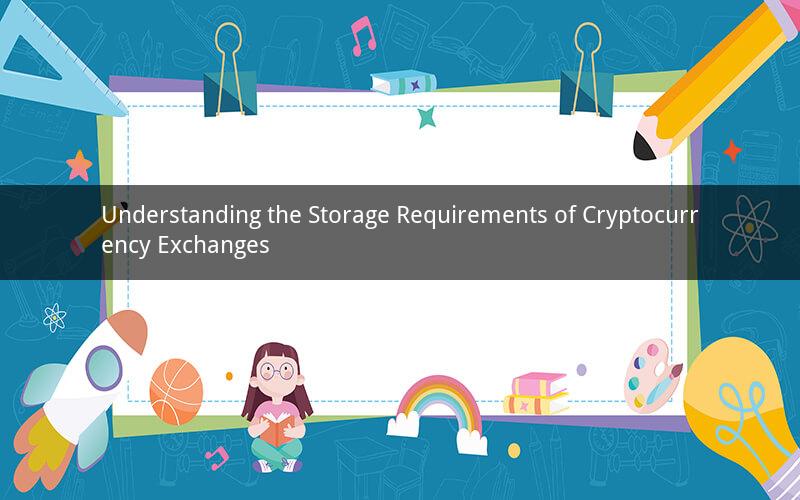
Cryptocurrency exchanges have become an integral part of the digital currency ecosystem, enabling users to buy, sell, and trade various cryptocurrencies. With the increasing popularity of digital currencies, the storage requirements for these exchanges have also surged. In this article, we will delve into the factors that determine the storage needs of a cryptocurrency exchange and explore the potential solutions to meet these demands.
1. Factors Influencing Storage Requirements
The storage requirements of a cryptocurrency exchange are influenced by several factors:
a. Number of supported cryptocurrencies: The more cryptocurrencies an exchange supports, the larger the storage space required to store their transaction histories and balances.
b. Transaction volume: Higher transaction volumes mean more data to store, as each transaction needs to be recorded and stored securely.
c. User base: A larger user base implies more accounts, transaction histories, and other data that need to be stored.
d. Regulatory compliance: Exchanges must comply with various regulations, which may require storing additional data, such as Know Your Customer (KYC) and Anti-Money Laundering (AML) information.
2. Storage Solutions for Cryptocurrency Exchanges
To meet the storage requirements of a cryptocurrency exchange, several storage solutions can be employed:
a. On-premises storage: This involves using physical servers and storage devices within the exchange's data center. On-premises storage offers greater control and security but can be costly and requires significant maintenance.
b. Cloud storage: Cloud storage providers offer scalable and cost-effective solutions for storing large amounts of data. They can help exchanges handle peak loads and ensure data redundancy.
c. Distributed storage: Distributed storage solutions, such as blockchain technology, can provide decentralized and secure storage for cryptocurrency exchanges. This approach can reduce the risk of data breaches and improve scalability.
3. The Importance of Secure Storage
Secure storage is crucial for cryptocurrency exchanges to protect user funds and data. Here are some key aspects of secure storage:
a. Encryption: Encrypting data can prevent unauthorized access and ensure that sensitive information remains confidential.
b. Access control: Implementing strict access controls can limit who can view or modify stored data, reducing the risk of data breaches.
c. Regular backups: Regularly backing up data ensures that exchanges can recover from data loss or corruption incidents.
4. The Cost of Storage
The cost of storage for a cryptocurrency exchange can vary significantly based on the factors mentioned earlier. Here are some factors that influence storage costs:
a. Storage capacity: The more data an exchange needs to store, the higher the cost.
b. Storage solution: On-premises storage can be more expensive than cloud storage, depending on the infrastructure and maintenance costs.
c. Data retention period: Exchanges that need to store data for longer periods will incur higher costs.
5. Future Trends in Cryptocurrency Exchange Storage
As the cryptocurrency market continues to grow, the storage requirements for exchanges are expected to increase. Here are some future trends in cryptocurrency exchange storage:
a. Increased adoption of cloud storage: Cloud storage providers are likely to become more popular among cryptocurrency exchanges due to their scalability and cost-effectiveness.
b. Enhanced security measures: Exchanges will continue to invest in advanced security technologies to protect user funds and data.
c. Decentralized storage solutions: Blockchain technology and other decentralized storage solutions may gain wider adoption, providing more secure and scalable storage options for exchanges.
Questions and Answers:
1. Q: How does the number of supported cryptocurrencies affect storage requirements for a cryptocurrency exchange?
A: The more cryptocurrencies an exchange supports, the larger the storage space required to store their transaction histories and balances.
2. Q: What are some storage solutions available for cryptocurrency exchanges?
A: Cryptocurrency exchanges can use on-premises storage, cloud storage, or distributed storage solutions, such as blockchain technology.
3. Q: Why is secure storage important for cryptocurrency exchanges?
A: Secure storage is crucial for protecting user funds and data, preventing unauthorized access, and ensuring compliance with regulations.
4. Q: What factors influence the cost of storage for a cryptocurrency exchange?
A: The cost of storage is influenced by storage capacity, storage solution, and data retention period.
5. Q: What are some future trends in cryptocurrency exchange storage?
A: Future trends include increased adoption of cloud storage, enhanced security measures, and the potential for decentralized storage solutions.